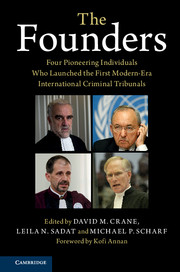 The Founders
The Founders 2 - The Cornerstone: Robert H. Jackson and the Nuremberg Tribunal
from PART I - PUTTING IT ALL IN CONTEXT
Published online by Cambridge University Press: 23 March 2018
Summary
History's first international criminal court was the Nuremberg Tribunal, created by the victorious Allies after World War II to prosecute the major German war criminals. After the Nuremberg trials, half a century would pass before the International Criminal Tribunal for the former Yugoslavia, the International Criminal Tribunal for Rwanda, the Extraordinary Chambers in the Courts of Cambodia, the Special Court for Sierra Leone, and ultimately the International Criminal Court (ICC) would be established. This book tells the stories of those modern tribunals through the firsthand narratives of their founding chief prosecutors. But to understand the context of those chronicles, one must begin with the tale of Robert H. Jackson, the chief US prosecutor of the Nuremberg Tribunal. Jackson died in 1954, but this chapter channels his spirit through his and others’ contemporaneous reporting of the role he played in negotiating the Charter of the Nuremberg Tribunal and prosecuting the first case ever to be tried by an international criminal tribunal.
Recently, on the seventieth anniversary of the judgment of the Nuremberg Tribunal, I was invited to speak at a historic conference in Nuremberg featuring the US attorney general and the founding chief prosecutors of the several modern international criminal tribunals whose chapters appear in the pages of this book. The opening session took place in Courtroom 600 at the Palace of Justice, the very venue where Jackson prosecuted the Nazi leaders after World War II. The venerable courtroom is now a museum piece, restored to its 1945 splendor. Standing at the podium where Jackson gave his legendary opening speech, I felt transported back to those heady times, when international justice was a lofty experiment for the ages.
Despite the passage of time, the events that prompted the formation of the Nuremberg Tribunal in 1945 are probably more familiar to most than those which led to the creation of the ad hoc tribunals and ICC at the end of the twentieth century.
- Type
- Chapter
- Information
- The FoundersFour Pioneering Individuals Who Launched the First Modern-Era International Criminal Tribunals, pp. 32 - 43Publisher: Cambridge University PressPrint publication year: 2018


